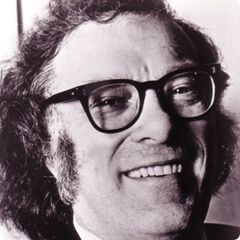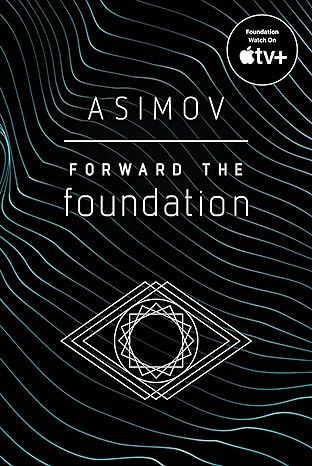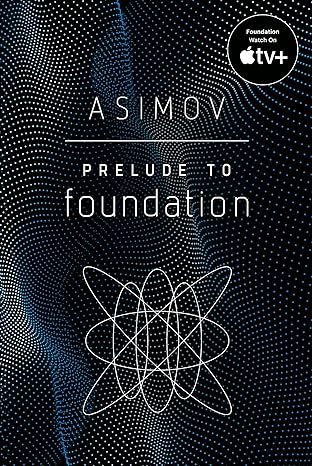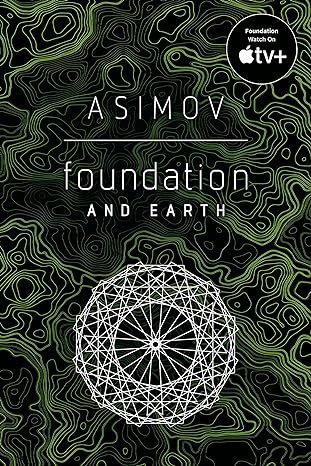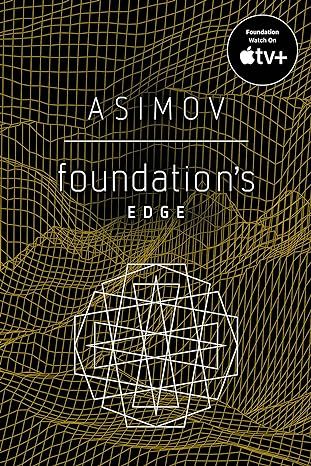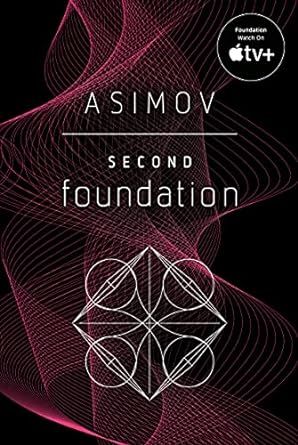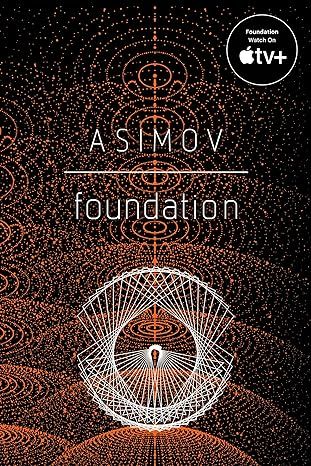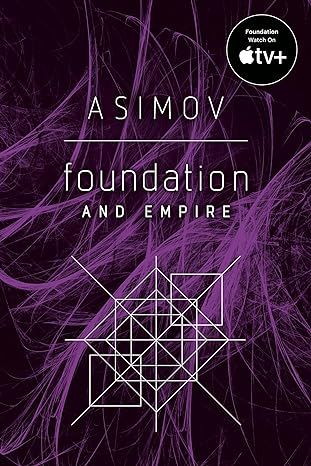
Foundation and Empire
4.5 out of 5
12,487 global ratings
The second novel in Isaac Asimov’s classic science-fiction masterpiece, the Foundation series
THE EPIC SAGA THAT INSPIRED THE APPLE TV+ SERIES FOUNDATION
Led by its founding father, the psychohistorian Hari Seldon, and utilizing science and technology, the Foundation survived the greed and barbarism of its neighboring warrior-planets. Now cleverness and courage may not be enough. For the Empire—the mightiest force in the Galaxy—is even more dangerous in its death throes. Even worse, a mysterious entity called the Mule has appeared with powers beyond anything humanly conceivable. Who—or what—is the Mule? And how is humanity to defend itself against this invulnerable avatar of annihilation?
Filled with nail-biting suspense, nonstop action, and cutting-edge speculation, Foundation and Empire is the story of humanity’s perpetual struggle against the darkness that forever threatens to overwhelm the light—and of how the courage of even a determined few can make all the difference in the universe.
About the authors
Isaac Asimov
Isaac Asimov was an American author and professor of biochemistry at Boston University, best known for his works of science fiction and for his popular science books. Asimov was prolific and wrote or edited more than 500 books and an estimated 90,000 letters and postcards. His books have been published in 9 of the 10 major categories of the Dewey Decimal Classification.
Asimov wrote hard science fiction and, along with Robert A. Heinlein and Arthur C. Clarke, he was considered one of the "Big Three" science fiction writers during his lifetime. Asimov's most famous work is the Foundation Series; his other major series are the Galactic Empire series and the Robot series. The Galactic Empire novels are explicitly set in earlier history of the same fictional universe as the Foundation series. Later, beginning with Foundation's Edge, he linked this distant future to the Robot and Spacer stories, creating a unified "future history" for his stories much like those pioneered by Robert A. Heinlein and previously produced by Cordwainer Smith and Poul Anderson. He wrote hundreds of short stories, including the social science fiction "Nightfall", which in 1964 was voted by the Science Fiction Writers of America the best short science fiction story of all time. Asimov wrote the Lucky Starr series of juvenile science-fiction novels using the pen name Paul French.
Read more
Reviews
Mariane Pedreira Munne
5
Classic classy sci-fi
Reviewed in the United States on March 24, 2024
Verified Purchase
Asimov is a master and the Foundation books are page turners. He weaves and paces the story as only a a writer of his caliber is able to do!
Ritesh Laud
5
The continuation of an epic series
Reviewed in the United States on January 19, 2002
Verified Purchase
Foundation and Empire is the second of the original Foundation trilogy written in the 1950s. The first book is Foundation and the last is Second Foundation. I enjoyed Foundation but I liked F&E quite a bit more! Foundation consists of five disconnected short stories, too short for adequate development of the settings or characters. F&E is much more focused, containing only two stories, the second of which really impressed me. A quick refresher on the background: The psychohistorian Hari Seldon was able to mathematically foresee the future of human society in the Milky Way. It wasn't pretty. Socio-economic forces were to cause the total collapse of the Trantorian Empire and lead to 30,000 years of anarchy and barbarism before a new empire restored peace and order. However, Seldon saw an "alternate path" that could reduce the duration of the Dark Ages to a single millennium. He established two societies (called Foundations) to bring this change about. In Foundation, we learn how the fledgling First Foundation established itself after Seldon's death and how it grew powerful. In F&E, Seldon is long dead and the First Foundation faces much more serious threats: a war with the dying but still powerful Trantorian Empire and a war with a mutant leader called The Mule who possesses incredible powers. The part about the war with the Empire is a straightforward narrative with a couple interesting twists. The second part about The Mule takes place a few decades later and is written in the style of a mystery, sort of like the first two Robot novels. Since The Mule is an individual of extraordinary power, Seldon's psychohistorical predictions for the First Foundation are in jeopardy because they deal only with masses of people and large scale socio-economic forces. Hence the second part is a more exciting read. :-) Also, until the end of the second part the Second Foundation is a mysterious society on the other side of the Galaxy about whom we know next to nothing. Although I guessed the nature of The Mule's powers, I did not guess his identity and it was a great surprise for me when it was revealed at the end. The events of the last two chapters are stunning and really make you want to rip into the third book. Yet F&E doesn't end on a cliffhanger and is quite satisfying in and of itself. This unique blend is a testament to Asimov's genius as an author. Also, you'll learn why the mutant calls himself The Mule and it's quite enlightening! With novels written later, Asimov tied together three series into one huge one! I recommend reading the entire 14-book series in the following order: the four Robot novels, the three Empire novels, and the seven Foundation novels (the original trilogy plus two prequels and two sequels). So far I've yet to read the last three Foundation books (Second Foundation, Foundation's Edge, Foundation and Earth), but so far most have been excellent and all have been well above average.
Read more
19 people found this helpful
CyberKnight
5
Who is the fool?
Reviewed in the United States on December 6, 2023
Verified Purchase
Another book full of interesting ideas that traverse from the scientific, to the psychoanalytic, to the psionic. Ideas that people consider to be for the best from many differing points of view, and how disparate they are. How they clash and one example of who could come out on top, which could be many different answers with a slight choice difference by the author. He does a masterful job of showing multifaceted objections of differing worlds and persons within. Rebellions that are, and those that could be. In spite of the older writing style, in the end this book brings to light things that can provide some of the most prevalent morals of today, and how treating others kindly can truly make all the difference.
Read more
DcLonChi
5
30 years on -- a great, but different, read
Reviewed in the United States on July 28, 2016
Verified Purchase
I'm reading the original Foundation trilogy for the 3rd (or maybe 4th?) time, but the first time in at least 20 years. I've got a few points to note, in no particular order:
-
Old science fiction tells us so much about the past. The things they never thought would change -- cigarettes, newspapers, women in the home, microfilm (!) -- show us just how prominent our blind spots can be. And the things they didn't even dream of (most obviously, the internet, but also race and s*xual relations, cell phones, etc.) tell us just how far and how quickly things change.
-
Reading it the first (and 2nd) time through, the young ambitious Federation reminded me of the USA -- young, resourceful, growing, upstarts. Now, I read it and the dying, corrupt, Empire reminds me of the USA. I'm not sure if this is my getting older (and pessimistic) or whether the times have changed so much since the 40s and 50s. In any case, there's an optimism in these books (like a lot of old sci-fi) that has long since passed out of (American?) pop culture.
-
There's a funny disconnect between 1 and 2 -- and I'm not sure where it is. So much has improved for so many, and yet the future now seems more scary than ever. Part of me reads this as escapist fun, part of me reads it to try to exercise my powers of optimism. (Without starting any arguments about current politics or which apocalyptic future I fear, let me say that I grew up in the Cold War with a very real fear of dying in a nuclear war -- the only bright side being that living in DC meant that I'd be incinerated instantly, and not suffer a lingering post-war death. Are any our current fears more likely or more catastrophic than that?)
-
There is little emotional depth in the Foundation. We don't get outsiders or brooding introspection, we learn about the characters through what they do. It reminds me a bit of the Icelandic sagas I just finished reading: lots of who did what, over how many generations -- and while there's little internal monologueing, you see that actions give insight into character. Perhaps it's our blind spot now to to think that how things feel to you is the most important thing in the world.
-
The Mule seems -- to my eyes -- a portent of 1960's. Without giving any spoilers, suddenly everyone sees that people's feelings are far more important and disruptive than any technology. (And the visi sonor seems so close to a depiction of an LSD trip that it makes me wonder what was going on in Asimov's personal life around this time!)
In conclusion, I encourage any old fans to pick up and re-read the series: you'll get something different out of it than the last time.
Read more
26 people found this helpful
Nicholas Ritter
4
The ending is worth it.
Reviewed in the United States on March 11, 2015
Verified Purchase
Long story short, I had a more difficult time getting into the characters and storyline than 'Foundation', but man did it pick up in the second half. It seems the book finally converged on a set of protagonists in the latter half of the book, and crescendoed to a satisfying end.
Reading Isaac Asimov's writing is like eating a lean cut of meat. Sure, I enjoy the occasional juicy, fatty steak, with its meticulously crafted settings and deep character development, but Asimov wastes no time. He'll stop to add a bit of depth and explanation here and there, but that's all, and the plot progresses at a blistering pace. It makes sense though. 'Foundation' introduced some of the most compelling concepts I have ever read, and this book follows suit. But this is why I ultimately give this book 4 rather than 5 stars. It was not its predecessor.
While the book adds more detail to Hari Seldons plan for the Galaxy, it was not nearly as progressive as 'Foundation's' ideas on psychohistory and cultural evolution. Nevertheless, 'Foundation and Empire' delivers many new elements and beautifully sets the stage for for the finale, 'Second Foundation'.
It's amazing how a series published in the '50s can seem so new to me. So far Asimov's precise and deliberate writing style combined with a truly unique story has blown me away. I cannot wait to learn how Seldons plan continues in the final book. If you haven't read 'Foundation', you're missing out. If you have, I wholeheartedly encourage you to continue and power through the first half of 'Foundation and Empire'. Then, savor the building anticipation for whomever and wherever the Second Foundation is inconspicuously spreading its dominance!
Read more
2 people found this helpful
Top Isaac Asimov titles
Best Sellers

The Great Alone: A Novel
4.6
-
152,447
$5.49

The Four Winds
4.6
-
156,242
$9.99

Winter Garden
4.6
-
72,838
$7.37

The Nightingale: A Novel
4.7
-
309,637
$8.61

Steve Jobs
4.7
-
24,596
$1.78

Iron Flame (The Empyrean, 2)
4.6
-
164,732
$14.99

A Court of Thorns and Roses Paperback Box Set (5 books) (A Court of Thorns and Roses, 9)
4.8
-
26,559
$37.99

Pretty Girls: A Novel
4.3
-
88,539
$3.67

The Bad Weather Friend
4.1
-
34,750
$12.78

Pucking Around: A Why Choose Hockey Romance (Jacksonville Rays Hockey)
4.3
-
41,599
$14.84

Start with Why: How Great Leaders Inspire Everyone to Take Action
4.6
-
37,152
$9.99

Tomorrow, and Tomorrow, and Tomorrow: A novel
4.4
-
95,875
$13.99
